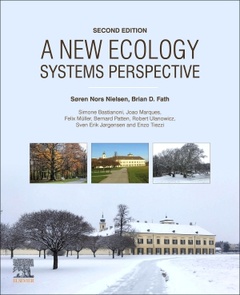A New Ecology (2nd Ed.) Systems Perspective
Auteurs : Nielsen Soeren Nors, Fath Brian D., Bastianoni Simone, Marques Joao C., Muller Felix, Patten Bernard D., Ulanowicz Robert E., Tiezzi Enzo

A New Ecology: Systems Perspective, Second Edition, gives an overview of the commonalities of all ecosystems from a variety of properties, including physical openness, ontic openness, directionality, connectivity, a complex dynamic for growth and development, and a complex dynamic response to disturbances. Each chapter details basic and characteristic properties that help the reader understand how they can be applied to explain a wide spectrum of current ecological research and environmental management applications.
1. Introduction2. Ecosystems have Openness (Thermodynamic)3. Ecosystems have Ontic Openness4. Ecosystems have Connectivity5. Ecosystems as self-organizing Hierarchies6. Ecosystems have Directionality7. Ecosystems have Complex Dynamics (Growth and Development)8. Ecosystems have Complex Dynamics (Disturbance and Decay)9. Ecosystem Principles have Broad Explanatory Power in Ecology10. Ecosystem Principles have Ecological Applications11. Ecosystems carry important messages to Managers and Policy Makers12. Conclusion13. References
Brian D. Fath is Professor in the Department of Biological Sciences at Towson University (Maryland, USA) and Senior Research Scholar at the International Institute for Applied Systems Analysis (Laxenburg, Austria). He has published over 180 research papers, reports, and book chapters on environmental systems modeling, specifically in the areas of network analysis, resilience, and sustainability. He co-authored the books Foundations for Sustainability: A Coherent Framework of Life–Environment Relations (2018) and Flourishing Within Limits to Growth: Following nature’s way (2015). He is also Editor-in-Chief for the journal Ecological Modelling. Dr. Fath was the 2016 recipient of the Prigogine Medal for outstanding work in systems ecology, and held a Fulbright Distinguished Chair at Parthenope University (Naples, Italy) in 2012.
Simone Bastianoni is a Full Professor of Environmental and Cultural Heritage Chemistry at the University of Siena, is Chair of the PhD School in Environmental, Geological and Polar Sciences.
He is President of the Emergy Society; Member of the Standard Committee of the Global Footprint Network; Specialty Chief Editor of the journal Frontiers in Energy Systems and Policy and Editor of the section Human Ecology and
- Contains revised, updated or redeveloped chapters that include the most current research and technology
- Reviews universal traits of ecosystems from multiple perspectives, giving the reader a complete overview of the systems perspective of ecology
- Offers broad examples of ecology as a systems science, from the history of science, to philosophy and the arts
- Brings together the systems perspective in a framework of four columns for greater understanding, including thermodynamics, network theory, hierarchy theory and biochemistry
- Contains new chapter on the application of the theory to environmental management
Date de parution : 08-2019
Ouvrage de 270 p.
21.4x27.6 cm
Thème d’A New Ecology :
Mots-clés :
2nd law of thermodynamics; Adaptability; Adaptive cycle; Agency; Allometric principles; Anthropocene; Autocatalysis; Biochemistry; Biodiversity; Boundaries; Centripetality; Chance; Collapse; Connectivity; Constraints; Contingency; Dissipative structures; Disturbance; Dynamics; Eco-exergy; Ecological engineering; Ecological indicators; Ecological network analysis; Economics; Ecosystem development; Ecosystem health; Ecosystem principles; Ecosystem theory; Embeddedness; Entropy; Environmental management; Evolution; Extremal properties; Goal functions; Gradients; Hierarchies; Hierarchy; Holon; Indeterminacy; Indeterminism; Indirectness; Integration of ecosystem theories; Irreversibility; Island biogeography; Keystone species; Metaphors; Mutualism; Networks; Niche theory; Nonlocality; Ontic openness; Open system(s)Thermodynamic openness; Openness; Optimal foraging; Policy targets; Relations; Reorganization; Resilience; Succession; Sustainability; Sustainable development goals; Thermodynamics; Time and space scales; Transactions; Uncertainty



